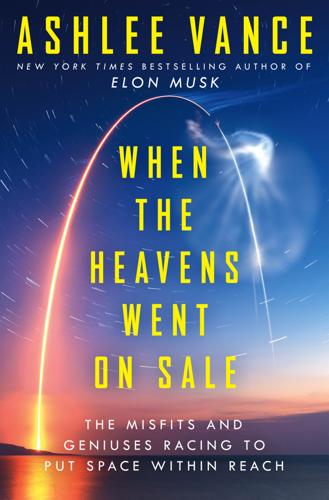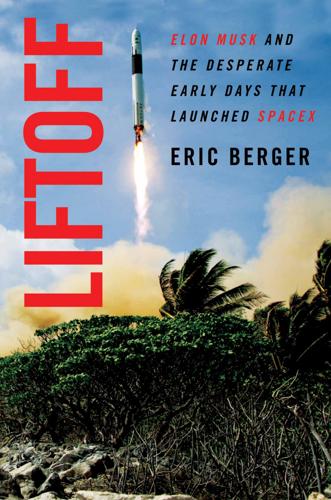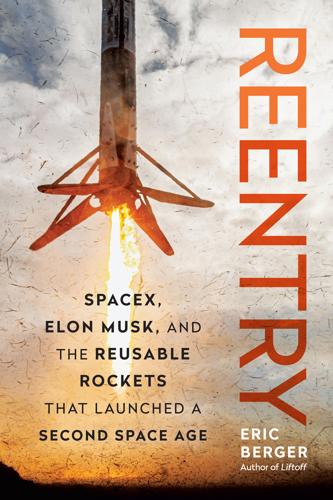Peter Beck: Rocket Lab
description: founder and CEO of Rocket Lab, a private aerospace manufacturer and small satellite launch service provider. The company is known for its Electron rocket, designed to launch small satellites into orbit at a relatively low cost. Rocket Lab aims to make space more accessible, particularly for commercial satellite operators
4 results

When the Heavens Went on Sale: The Misfits and Geniuses Racing to Put Space Within Reach
by Ashlee Vance · 8 May 2023 · 558pp · 175,965 words
for cheap rockets that can be fired off at will has come. The company doing the best to prove this theory right is Rocket Lab, which was started by Peter Beck in Auckland, New Zealand. Beck does not date famous actors, nor does he have an electric car company or make wild pronouncements on
…
neighborhood. My day had been spent hanging out at the main factory of Rocket Lab, a maker of small rockets, and my thoughts had been on the company and its founder, Peter Beck. One of Musk’s assistants, however, had contacted me after my Rocket Lab visit to say that Elon would be calling any minute, which required
…
turned out that Musk wanted to talk with me about Tesla and how the company had navigated a disastrous year and come out the other side alive. We did that for a while, and then I steered the conversation back to Rocket Lab. Peter Beck’s company had recently joined SpaceX in the ranks of successful private
…
the concept remained the same. It was to be a small rocket that could be flown cheaply and carry a few satellites into space on each journey. What really made me skeptical of Rocket Lab, though, was Peter Beck, and the fact that he was trying to build a rocket in New Zealand. Beck, various stories
…
flight. He said it with such enthusiasm and confidence that I wanted to believe him and to believe that Rocket Lab would start a new, exciting era in commercial space. But all I could really do was smile politely, while chuckling to myself on the inside. Hadn’t Peter Beck read about what happens next? First
…
. A Māori ceremony was held to bless the rocket, as everyone prepared for a good show. No first rocket launch goes off without a hitch, and Rocket Lab met its nemesis in the form of a defective small fitting that controlled part of the fueling process. The part cost $5, but it was
…
at that product, dream about what could come next, and cut you a fresh batch of much larger checks. Had Rocket Lab been based in California, its first rocket surely would have served these purposes well. Peter Beck had reached space almost on his own and on the tightest of budgets. He’d invented new technology
…
inventor guy in the middle of nowhere sends hobby rocket to space. Good for him. The only major players who saw much potential in Beck and Rocket Lab came from people in the US military. If someone had managed to send an object cheaply into space, they wanted to talk to that someone
…
-of-fact approach. He was going to fly to Silicon Valley, and he was not going to come back without a big bag of cash. Rocket Lab was going to make a real rocket. Chapter Fourteen Enter Electron Put yourself into Peter Beck’s shoes for a moment. In 2013, he was in his midthirties
…
around would be different because Rocket Lab had pluck and grit and would solve the endless stream of technical challenges that had stumped thousands of people for decades. It would make awesome rockets, and it would make awesome money. Trust me, guys. I’m Peter Beck. I have floppy hair, cool charts, and enthusiasm. Beck would turn up
…
the company had fallen behind Beck’s optimistic schedule, its efforts were impressing outsiders. Potential investors watched as SpaceX launched more and more rockets, and Rocket Lab’s rivals such as Virgin Orbit and Firefly were reporting some early successes with their programs. All of that made commercial space feel more real. Beck opted to
…
rocket unsafely. If someone sent a command to stop the rocket and the machine did not stop, Rocket Lab would be exposed as a clumsy, cavalier amateur. It would not matter if the rocket damaged anything or not. People would simply think that Peter Beck and his merry band of youngsters could not be trusted. The
…
trust it to try another launch again. Altman was among the dozens of Rocket Lab engineers who had trekked to Māhia on
…
software glitch had prevented Rocket Lab from achieving one of the most extraordinary and rare feats by flying successfully to space on the first try. Worse, it hadn’t even been a Rocket Lab software glitch that had wrecked the moment. No. It was the babysitters. They were the ones who sucked Peter Beck’s soul right
…
out of his body and stepped on it. Even after the mishap, most of the Rocket Lab engineers were thrilled at what they’d accomplished. The rocket had spent four minutes spewing out data
…
end of the tunnel is slightly closer, and that’s it.” Chapter Fifteen You’ve Got Our Attention In November 2018, Rocket Lab raised another $140 million and became that most mythical of creatures: a space unicorn. Its investors valued the company at well over $1 billion. Peter Beck had been forced to give away a
…
huge part of his stake in Rocket Lab, but he still owned about a quarter
…
with more strips of red LED lights. Peter Beck had more or less built Darth Vader’s rocket-launching lair, and he was not coy about it. Music from Star Wars pumped out of surround-sound speakers on an endless loop. Deeper inside the building, Rocket Lab’s facilities were less sinister but equally spectacular
…
raised nearly half a billion dollars to date. We’ve been successful not just in raising capital but in the things we have achieved. Electron and Rocket Lab is the only commercially active small-launch vehicle in the world right now. There’s only two private companies in the history of humanity that
…
reason Beck asked to meet with Musk could be chalked up to ego.* Understandably, Beck wanted people to realize that he and Rocket Lab were in the same ultraelite club as Musk and SpaceX. More to the point, he wanted Musk to recognize him as a peer. Beck retained much of his low-key
…
, particularly when it came to small rockets. Kemp spent several months doing just that and visiting dozens of companies. Naturally, he made a trip to New Zealand to visit Peter Beck and Rocket Lab. He also ended up knocking on the door of Ventions and meeting London. London had earned a PhD in aerospace engineering from MIT
…
try to launch again. That would hurt not only for the delays it would cause and the costs it would add but also because Rocket Lab would be launching a rival rocket and shoving it in Astra’s face. Peter Beck had exactly that mouthwatering scenario in mind when he had come up with the “It
…
’s Business Time” moniker for Rocket Lab’s upcoming mission. “This is the first day we set out
…
attempt today. The rocket did not launch that day. On November 11, Rocket Lab returned to its pad in New Zealand and launched its third rocket. Technical delays had pushed back the “It’s Business Time” campaign, but now Peter Beck could gloat: Rocket Lab was signaling to everyone in the industry that the company had reached
…
from the test stands to the rocket to the launcher.* Chris Kemp and Peter Beck never feuded in public, but the men did not really care for each other. Kemp had visited Rocket Lab and Beck while scouting launch companies on behalf of Planet Labs and had been given the royal treatment. Beck had flown Kemp by
…
completed its mission if it hadn’t been blown up by the safety officials. Watching from afar, Peter Beck hoped that the latest gaffe might stop Kemp from slagging off Rocket Lab’s machines as being overengineered and wondered if it might spell the end of Astra altogether. “He must be out of money by
…
. As a public company, we now have the full capability to get to daily space operations.” Upon learning about Astra’s fundraising and move to go public, Peter Beck at Rocket Lab nearly stroked out. He wrote me saying that it was one thing to work over venture capitalists who know the risks they’re
…
will do so much better.” When the pandemic first engulfed the world, it looked as though the entire New Space gang, excluding SpaceX, Planet Labs, and Rocket Lab, might disappear. The rocket-making start-ups had all been struggling. The satellite start-ups were plowing through cash while they awaited rides to space
…
chaos accompanying the fall of the Soviet Union to make a fortune. He would use the wisdom gained from his other business dealings and trample people such as Peter Beck and Chris Kemp. “Most of the people in the space business are like children,” he said. “They don’t understand what a dollar means
…
them to do his bidding without their even realizing it” would make for a pretty good story. Peter Beck has kept right on being Peter Beck and has remained a step or several ahead of the competition. Rocket Lab went public in mid-2021, raising hundreds of millions of dollars on its way to being valued at
…
space companies that had gone public. He predicted a $1 trillion space economy by 2040. He also took a shot at Rocket Lab for still not launching rockets as often as Peter Beck had predicted. He closed the event by championing the work of his employees. Astra had been the smallest team ever assembled
…
Eveleth. (Planet) Peter Beck on his rocket bike. (Rocket Lab) Peter Beck during his rocket pilgrimage in the US. (Rocket Lab) Rocket Lab’s Electron rocket awaiting launch. (Kieran Fanning) Rocket Lab’s launch complex on the Māhia Peninsula in New Zealand. (Rocket Lab) Rocket Lab’s production line in New Zealand. (Rocket Lab) Rocket Lab’s Darth Vader–inspired Mission Control center in Auckland. (Rocket Lab) Rocket Lab’s CEO, Peter Beck, at the company
…
’s launch site in New Zealand. (Rocket Lab

Liftoff: Elon Musk and the Desperate Early Days That Launched SpaceX
by Eric Berger · 2 Mar 2021 · 304pp · 89,879 words
time attracting funding for all manner of space ventures after investors witnessed the success of SpaceX with its Falcon 1 and Falcon 9 rockets. “It helped the whole industry,” said Peter Beck, whose successful Rocket Lab company has launched more than a dozen small Electron rockets from New Zealand since 2017. “It proved that a
…
private capital can do meaningful things in space. And regulators have learned from SpaceX what commercial launch is all about, and they have a political mandate to help rather than hinder. But the new companies have gone slower. Only one private company with new technology, Rocket Lab, has actually reached orbit. It took eleven
…
32, 262 Ride, Sally, 50, 99–100 Riley, Talulah, 216 “Risk tolerance,” 245 Rocket Boys (Hickam), 153 Rocketdyne, 32, 33, 126. See also Aerojet Rocketdyne Rocket Lab, 236, 245 Rocket reuse, 230–34 Role models, 99, 100 Romo, Eric, 155, 261 Ronald Reagan Ballistic Missile Defense Test Site, 55, 58, 67, 169

Reentry: SpaceX, Elon Musk, and the Reusable Rockets That Launched a Second Space Age
by Eric Berger · 23 Sep 2024 · 375pp · 113,230 words
confidence they’re going to get there anytime soon. In the United States there are SpaceX alternatives more efficiently run, most notably Rocket Lab. The company’s founder and chief executive, Peter Beck, is a pretty amazing dude. If you read Ashlee Vance’s book, When the Heavens Went on Sale (Ecco, 2023), you can
…
’t help but be impressed by how far Beck has come, starting from nothing and nowhere. However, Rocket Lab has substantially fewer resources to hand than
…
SpaceX or Blue Origin. I eagerly anticipate Rocket Lab’s new medium-lift launch vehicle with a reusable first stage, but it is more than a
…
decade behind the Falcon 9. Frankly, I believe Bezos should buy Rocket Lab and empower Beck. That has the best chance of molding Blue Origin into a true SpaceX competitor. There are other promising new space companies in the
…
systems for maintenance on NASA’s attempts at recovery of Russia’s view of Richeson, Justin Ridings, Holly Rocketdyne rocket engines. see also specific engines Rocket Lab rockets. see also specific types of rockets critical design reviews for flight software for fuel needs for horizontal speed for launch noise levels for liquid

Fully Automated Luxury Communism
by Aaron Bastani · 10 Jun 2019 · 280pp · 74,559 words
providing cheap, weekly launch opportunities for low-Earth orbit, they will enter the slipstream of larger companies like SpaceX, Boeing and Jeff Bezos’s Blue Origin. One such company is Rocket Lab. Founded in New Zealand in 2009, it was the first private company in the Southern Hemisphere to send a booster rocket
…
outfits are capable of innovating in this area – albeit exclusively with smaller payloads – is remarkable. As the sector grows it will be companies like Rocket Lab that become the backbone of an incipient industry. Falling Costs, Rising Ambitions Winning the race to land on the Moon didn’t come cheap. In
…
$100 million. Nevertheless, even those figures mean many companies and individuals stand little chance of reaching space, and even if they have the means to do so, there is currently a two-year waiting list for launch. That could all change with Rocket Lab’s commitment to launching every week on a projected cost
…
has not only reduced costs but decreased build time from months to days. All of this also allows rapid scalability. As the company’s CEO Peter Beck puts it, ‘The vehicle was designed from the outset to be mass produced … [we have a] 3-D-printed engine – with six printers [we]
…
– from its high-performance electric motors and lithium-polymer batteries, to the 3-D printers used in construction – are on the same experience curve as the technologies outlined in the last chapter, these rockets will, like so much else, only get cheaper from here. Rocket Lab isn’t the only new player eager
…
Rob and Jessica Orwig. ‘SpaceX Is about to Launch Its Monster Mars Rocket for the First Time – Here’s How It Stacks Up Against Other Rockets’. Business Insider, 4 January 2018. SpaceX. ‘SpaceX Interplanetary Transport System’. YouTube.com, 27 September 2016. Birth of a Private Space Industry End, Rae Botsford. ‘Rocket Lab: The
…
Electron, the Rutherford, and Why Peter Beck Started It in the First Place’. Spaceflight Insider, 2 May 2015. Spacevidcast. ‘SpaceX Reaches Orbit with Falcon 1 – Flight 4 (Full Video Including
…
NASA. Dorrier, Jason. ‘Risk Takers Are Back in the Space Race – and That’s a Good Thing’. Singularity Hub, 17 August 2017. Erwin, Sandra. ‘Rocket Startup Sees Big Future in Military Launch’. Space News, 1 July 2018. Gush, Loren. ‘Rocket Lab Will Launch Its Small Experimental Rocket Again this December’. The Verge, 29
…
November 2017. Knapp, Alex. ‘Rocket Lab Becomes a Space Unicorn with a $75 Million Funding Round’. Forbes, 21 March 2017. Lo, Bernie and Nyshka Chandran. ‘Rocket Lab Nears Completion of World’s First Private Orbital Launch Site in New Zealand’. CNBC, 28 August 2016
…
. ‘Rocket Lab Reveals First Battery-Powered Rocket for Commercial Launches to Space’. Rocket Lab USA, 31 May 2015. Pielke, Roger, Jr. and Radford Byerly, Jr. ‘The Space Shuttle Program: Performance versus Promise’. Space Policy Alternatives, Westview Press, 1992.
…
, 79 Rio Earth Summit, 98, 197 robots about, 78, 133 Atlas, 82–3, 132 da Vinci surgery robot, 90 information technology and robotics, 76 ‘KIVA’, 89 rise of, 80–2 Rocket Lab, 121, 122, 123 Romer, Paul, 63–5, 199–200 Roosevelt, Franklin, 194 Rutter, Brad, 80 Sanders, Bernie, 29, 30 Saturn